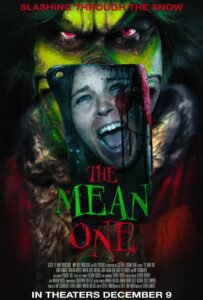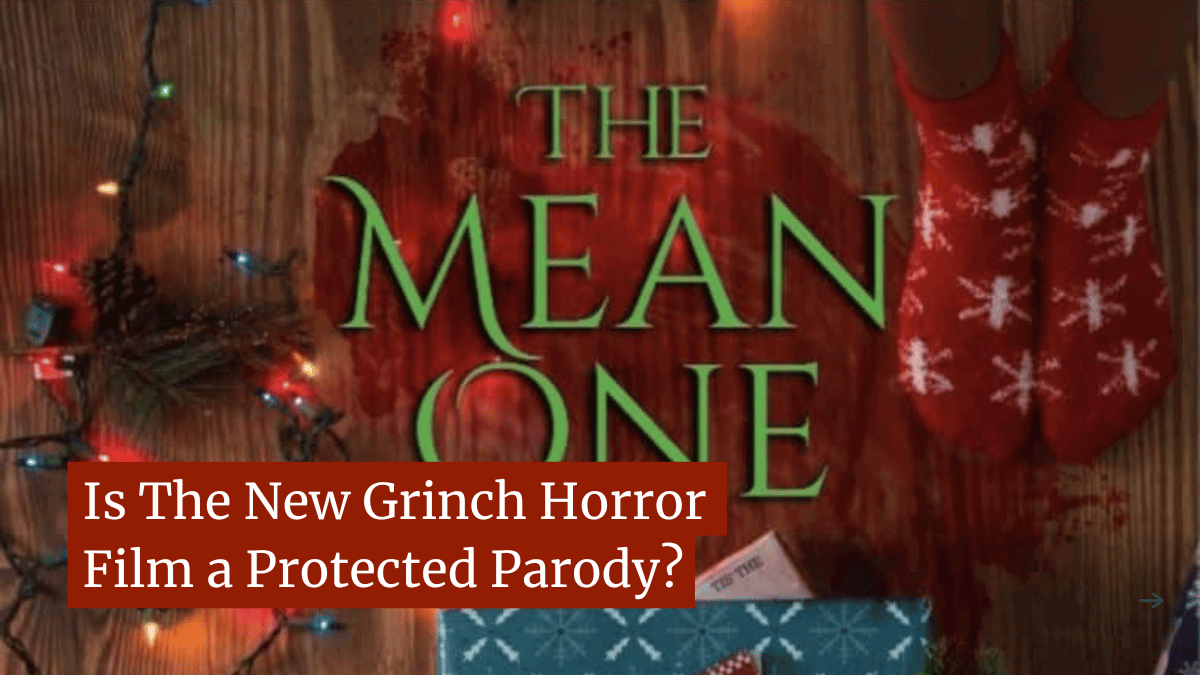Is the Grinch Slasher Film a Protected Parody?

The upcoming release of the film The Mean One has been getting a great deal of attention from the media. Reimagining the classic Grinch character from Dr. Seuss’ How the Grinch Stole Christmas as a slasher movie villain, seems to have many excited about the possibilities.
However, one question that has come up repeatedly has been how the film can legally use the character without the permission of the Dr. Seuss estate. In a recent interview with Entertainment Weekly, director Steven LaMorte answered that question.
“Well, parody is protected by the constitution. I don’t want to say that I’m a legal scholar, but I’ve done more than my fair share of research and consultation just to make sure that we’re not denigrating the source material. I love these stories; we want to honor it, of course, but it’s a parody; it’s supposed to be funny. Every word and script choice was chosen with the intention of really sticking to the letter of the law and making sure that we are a parody. We just wanted to put our own spin on it.”
While parody isn’t protected in the Constitution, fair use was codified into U.S. law with the Copyright Act of 1978, his point remains. He views The Mean One as a parody of the source material and, as such, it’s protected under the law.
But is he correct? Well, we don’t have too look far to find some direct comparisons.
Who’s Holiday and Other Places to Boldly Go
The Mean One isn’t the far from the first raunchy parody of How the Grinch Stole Christmas and, if litigation does happen, it won’t be the first to end up in court.
Back in 2017, a group made plans to stage a play entitled Who’s Holiday, a one-woman show featuring a foul-mouthed grown up version of Cindy Lou Who. The play featured substance abuse, talk of murder and a variety of other themes out of step of kid-friendly source material.
As the play got closer to opening, the Seuss estate sent cease and desist letters to try and stop it. However, Those behind the play filed a lawsuit seeking a ruling that they were a protected parody and, thus, non-infringing.
The judge at the district court level ruled in favor of the play, and that decision was affirmed by the Second Circuit Court of Appeals. The verdicts enabled the play to move forward and also caused myself to get in on the fun of parodying How the Grinch Stole Christmas with my copyright-themed version of the poem.
However, the opposite happened with a Star Trek/Dr. Seuss mashup book entitled Oh, the Places You’ll Boldly Go! In that case, ComicMix LLC was seeking to release a comic book that mashed up themes from the two elements, only to have the Ninth Circuit Court of Appeals rule against them, saying it was not protected by fair use.
The case was settled before going to an eventual trial.
It’s important to note that the two cases were very different in nature. Where Who’s Holiday! used nothing from the source material beyond the characters and general plot points, Oh, the Places You’ll Boldly Go! was accused of copying specific elements, including parts of some of the original artwork. The latter was also notably less directly humorous, relying more on the mashup of the two different elements than direct jokes at the expense of the source material.
To that end, The Mean One feels more similar to Who’s Holiday! than it does Oh, the Places You’ll Boldly Go! However, there is another place we can look, the strange world of pornographic parodies.
Porn Parodies and Fair Use
While the idea of turning mainstream characters into slasher movie villains is a fairly new one, such characters have been appearing in genre-shifting parody films for decades, in particular in the adult content industry.
As we talked about in 2012, the pornographic film industry has been releasing “porn parodies” of popular movies and characters for decades. To that end, no intellectual property has been safe, nearly every franchise has been the subject of multiple pornographic adaptations.
This includes The Grinch, who was the feature of a 2017 film by Screwbox (Note: Link goes to the IMDB page).
These parodies have, outside of a few verbal barbs, have gone largely unchallenged. Lawsuits about such parodies are virtually nonexistent, and rulings about them even less common.
In fact, when Nintendo wanted to prevent the distribution of a porn parody of the Super Mario Brothers series, they opted to buy up the distribution rights to the film rather than file a lawsuit.
Simply put, lawsuits against such films are an expensive proposition with a limited chance of success. Parody has strong protection under both trademark and copyright law, and the risks associated with targeting such parodies are seen as greatly outweighing the possible gains.
That, in turn, is also likely the case here.
Bottom Line
So, where does this leave The Mean One? Between the Who’s Holiday! ruling and the history with pornographic parodies, likely in a good place.
It’s almost certain that the Seuss estate has been aware of this film for some time and, if they haven’t opted to file a lawsuit by now, it’s unlikely they’ll do so after the release.
Granted, we have no way of knowing if the film truly is a parody or may have other legal issues. Until the movie is released, we don’t know what is in it and what potential legal issues may arise.
However, from a broad standpoint, parodies do enjoy a large amount of protection. This is something that the Seuss estate have learned themselves the hard way, and it’s even been codified into something of a norm when it comes to pornographic parodies.
So while there may be some legal questions depending on the specifics of the film, litigation seems unlikely.
However, if I were LaMorte, I’d consider sending a thank-you card to the team behind Who’s Holiday! Their successful defense likely helped to pave the path for his film to get made.
Want to Reuse or Republish this Content?
If you want to feature this article in your site, classroom or elsewhere, just let us know! We usually grant permission within 24 hours.
